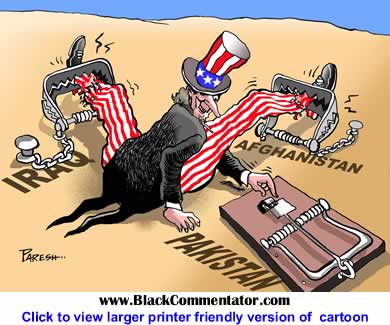The US have been interested in a pipeline across Afghanistan for a long while now. In 1997 the Taliban were in Texas negotiating with Unocal (whom Hamid Karzai worked for - "coincidence")
And indeed even in March 2001 the Taliban were sending negotiators to the US, and there is even a revealing interview with a Taliban spokesperson in the NYT from that time.
Here's an article from 1997:
Taleban in Texas for talks on gas pipeline
The 1,300km pipeline will carry gas across Afghanistan's harsh terrain
A senior delegation from the Taleban movement in Afghanistan is in the United States for talks with an international energy company that wants to construct a gas pipeline from Turkmenistan across Afghanistan to Pakistan.
A spokesman for the company, Unocal, said the Taleban were expected to spend several days at the company's headquarters in Sugarland, Texas.
Unocal says it has agreements both with Turkmenistan to sell its gas and with Pakistan to buy it.
The Afghan economy has been devasted by 20 years of civil war
But, despite the civil war in Afghanistan, Unocal has been in competition with an Argentinian firm, Bridas, to actually construct the pipeline.
Last month, the Argentinian firm, Bridas, announced that it was close to signing a two-billion dollar deal to build the pipeline, which would carry gas 1,300 kilometres from Turkmenistan to Pakistan, across Afghanistan.
In May, Taleban-controlled radio in Kabul said a visiting delegation from an Argentinian company had announced that pipeline construction would start "soon".
Kabul
The radio has reported several visits to Kabul by Unocal and Bridas company officials over the past few months.
A BBC regional correspondent says the proposal to build a pipeline across Afghanistan is part of an international scramble to profit from developing the rich energy resources of the Caspian Sea.
With the various Afghan factions still at war, the project has looked from the outside distinctly unpromising.
Last month the Taleban Minister of Information and Culture, Amir Khan Muttaqi, said the Taleban had held talks with both American and Argentine-led consortia over transit rights but that no final agreement had yet been reached. He said an official team from Afghanistan, Pakistan and Turkmenistan should meet to ensure each country benefited from any deal.
However, Unocal clearly believes it is still in with a chance - to the extent that it has already begun training potential staff.
It has commissioned the University of Nebraska to teach Afghan men the technical skills needed for pipeline construction. Nearly 140 people were enrolled last month in Kandahar and Unocal also plans to hold training courses for women in administrative skills.
Women face working restrictions under Taleban rule
Although the Taleban authorities only allow women to work in the health sector, organisers of the training say they haven't so far raised any objections.
The BBC regional correspondent says the Afghan economy has been devastated by 20 years of civil war. A deal to go ahead with the pipeline project could give it a desperately-needed boost.
But peace must be established first -- and that for the moment still seems a distant prospect.
http://news.bbc.co.uk/2/hi/world/west_asia/37021.stm






